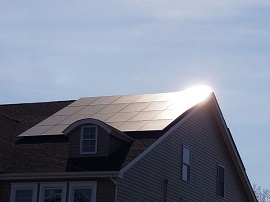By Solar Expert
January 22, 2024

The shift towards renewable energy sources has seen a significant rise in the adoption of solar power systems. As homeowners and businesses alike turn to solar energy, understanding the nuances of solar panel installation becomes increasingly important. Among the various factors that influence the efficiency and productivity of a solar setup, three aspects stand out: Shade, Azimuth, and Angle/Pitch. These elements play a crucial role in determining the overall effectiveness of a solar installation. This article aims to shed light on these key factors, offering valuable insights for those considering solar power. Whether you're a seasoned solar installer or a prospective solar energy user, understanding these aspects can significantly enhance the performance of your solar panels.
Understanding the Impact of Shade
Shade, often overlooked, is a critical factor in solar panel efficiency. Even a small amount of shade on a panel can significantly reduce its energy output. The impact of shade stems from the way solar cells are interconnected within a panel. When a part of the panel is shaded, it not only reduces its productivity but can also affect the output of the entire system.
Common Sources of Shade and Their Solutions
Real-World Applications In practice, a skilled solar installer plays a pivotal role in mitigating the effects of shade. They conduct thorough site assessments to identify potential shading issues and devise strategies to minimize their impact, ensuring maximum solar production.
The Role of Azimuth in Solar Installations
Azimuth refers to the direction in which a solar panel faces, usually measured in degrees from true north. This orientation plays a vital role in determining the amount of sunlight your solar panels will receive throughout the day.
Optimizing Solar Production with Azimuth
Azimuth Settings by Region
| Region | Optimal Azimuth |
|---|---|
| Northern Hemisphere | True South |
| Southern Hemisphere | True North |
| Equatorial Regions | Directly Upward |
The Expertise of a Solar Installer A professional solar installer assesses the local environment, sun path, and other geographical factors to determine the ideal azimuth for your solar panels. Their expertise ensures that the panels are positioned for maximum sun exposure, significantly enhancing energy production.
Understanding the Importance of Angle/Pitch
The angle or pitch of a solar panel is the angle at which the panel is tilted, relative to the horizontal ground. This angle is crucial for maximizing the solar energy absorption.
Relationship Between Angle/Pitch and Solar Efficiency
Ideal Angles for Different Regions
| Latitude Range | Recommended Angle |
|---|---|
| 0° - 30° | 15° - 30° |
| 31° - 45° | 30° - 45° |
| 46° - 60° | 45° - 60° |
| 60°+ | 60° - 75° |
The Role of a Solar Installer in Angle Optimization Determining the correct angle for solar panels is not always straightforward. A professional solar installer uses precise tools and calculations to set the optimal angle, taking into account local climate, seasonal sun paths, and other environmental factors.
The efficiency and productivity of a solar power system hinge on several critical factors, with Shade, Azimuth, and Angle/Pitch being paramount among them. Understanding and optimizing these aspects can lead to a significant increase in solar energy production.
Shade can dramatically reduce the efficiency of solar panels. It's essential to identify potential sources of shade and mitigate their impact through strategic placement and, if necessary, modification of the environment.
Azimuth plays a vital role in aligning the solar panels with the sun's path. The optimal direction depends largely on geographical location, with panels in the Northern Hemisphere generally facing true south and those in the Southern Hemisphere facing true north.
Angle/Pitch is about tilting the solar panels at the ideal angle to capture the maximum amount of sunlight. This angle varies depending on the latitude of the installation site and can be adjusted for optimal year-round solar absorption.
The role of a professional solar installer in this process cannot be overstated. Their expertise in assessing environmental factors, understanding regional variations, and making precise adjustments is crucial in maximizing the effectiveness of a solar installation. They not only ensure that the panels are installed correctly but also that they operate at peak efficiency throughout their lifespan.
For anyone considering solar energy, consulting with a qualified solar installer is a vital step. They can provide invaluable guidance tailored to your specific location and needs, ensuring that your solar power system is as productive as possible. Remember, the right adjustments in Shade, Azimuth, and Angle/Pitch can make all the difference in harnessing the power of the sun efficiently and sustainably.
Zero $ out
of pocket
Max credits
incentives
Honest &
transparent
14 years of
100% solar
1. Estimate savings on your energy use 2. Leverage the best state incentives
Try our Layout Design Tool!
MAIN OFFICE
216 River Avenue
Lakewood, NJ 08701
732-987-3939
NEW JERSEY
2 University Plaza #100-1
Hackensack, NJ 07601
201-624-9696
NEW YORK
56 South Main St Suite #2
Spring Valley, NY 10977
845-553-7100
NYC
1310 Coney Island Ave
Brooklyn, NY 11230
718-502-3200
MIAMI FLORIDA
66 West Flagler Street
Suite 900-3747
Miami, FL 33130
786-732-3306